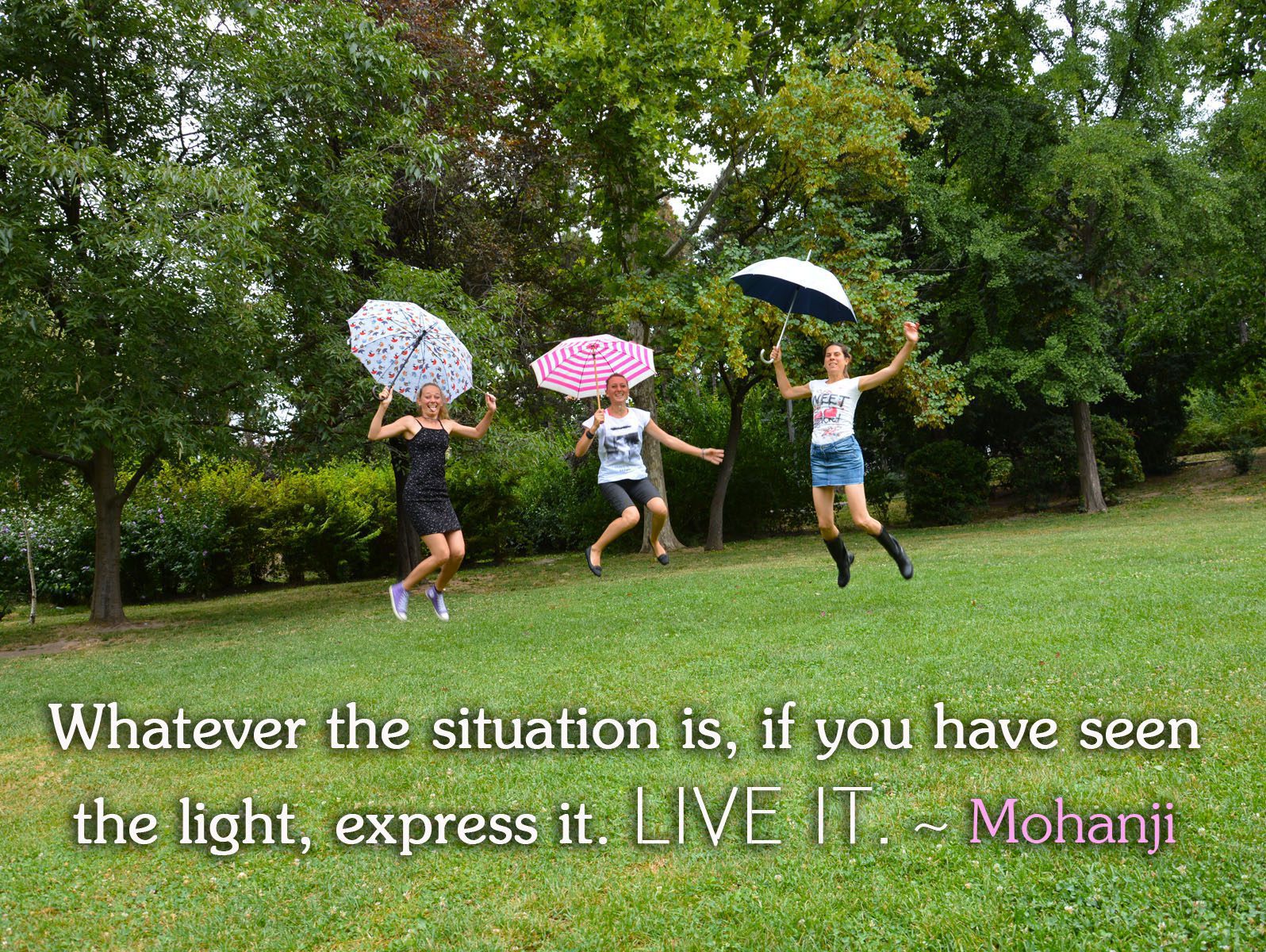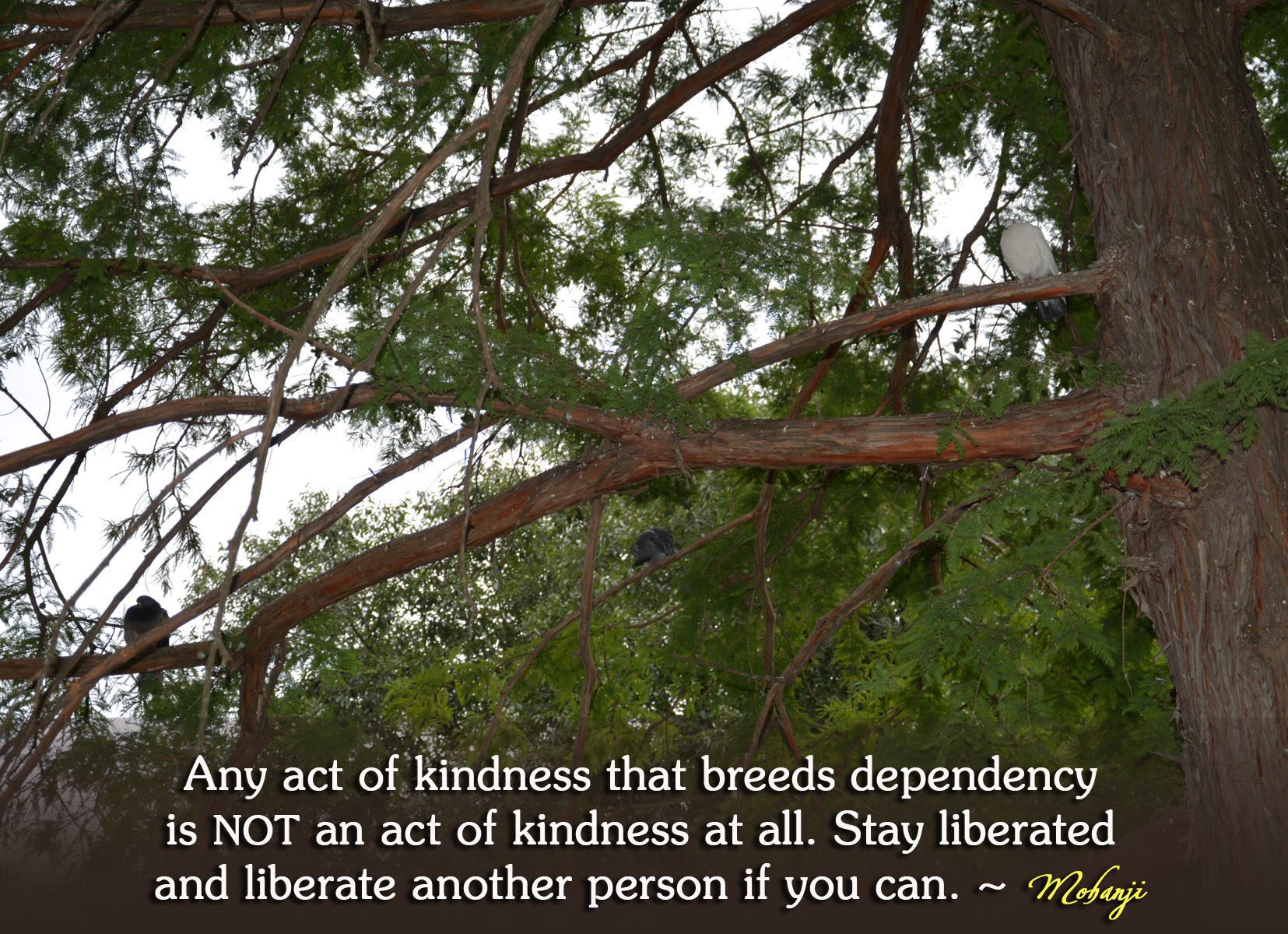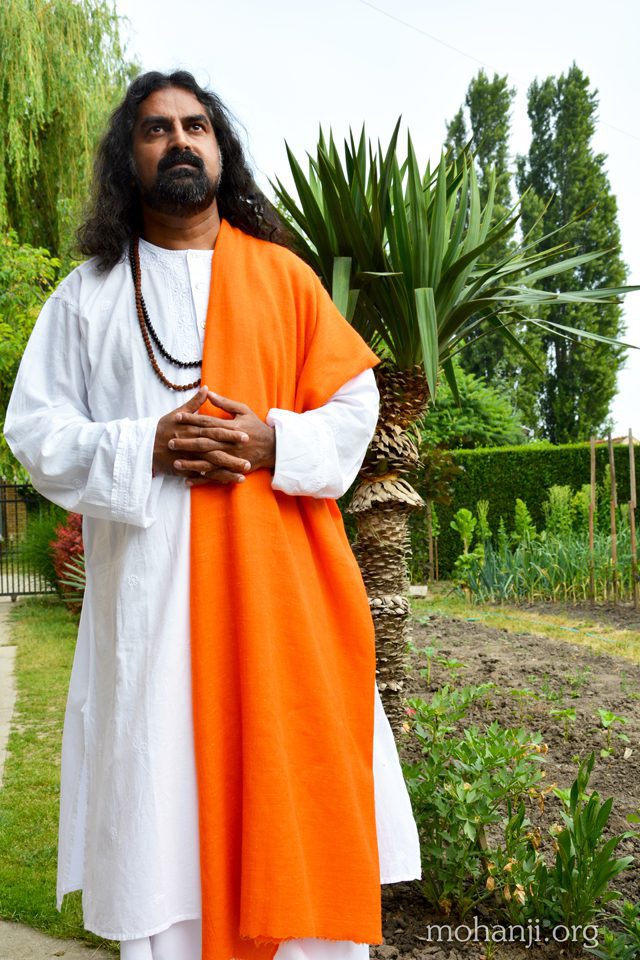Satsangs from Serbian Retreat with Mohanji, 9-14th May, 2014
Q: Could you tell us more about how to handle collective karma in certain country, in Serbia or South Africa?
A: Collective karma can never be handled individually. We are at a particular place or time because we are supposed to experience a particular karma. This is also why we are born in a particular place, to a particular set of parents, and we had a particular type of education, knowledge, awareness, understanding- this is all fundamental.
Likewise, collective karma, collective consciousness creates events. And many people get affected or get fulfilment from the events. This is because we chose it. We wanted to be there in that environment.
Many people who had been with Jesus, have come back many times over into particular places because they had to experience similar or exact type of events and emotions so that they could clarify themselves, overcome and then merge with the consciousness.
So every place and situation has a reason, amounting to our experience in the deepest way. But whatever the situation is, if you have seen the light, or if you have higher awareness, you are supposed to express it. You are supposed to live it. And lead through life. This is what Mahatma Gandhi did, this is what all the great leaders did, they lived the truth.
They lived the conviction. Maybe that specific generation will not understand, but generations to come will understand. Usually, anybody who spoke the truth, was not appreciated by the contemporaries. But eventually, they became heroes. This is ok, this is the way the world goes. You are seeing the light and you are eager to convey it.
The world may say you are crazy, they may not appreciate you, but that’s not our problem. Our purpose is to express, because we have our body. What we are expressing is ultimate truth. If you are living one day, live your conviction. If you are living one day, live truth. If you are living just one day, live like a king.

Q: If we are supposed to help somebody and that person is a victim, and we become addicted to that role. Then it’s not actually a helping hand. It is difficult especially as we aren’t established in total awareness.
Both professionally and personally we are selfless, but how to respond when at the same time I feel I’m not helping that person. The same thing is with a beggar in the street. I know I’m not helping him if I just give him money. Begging for a living is his lifestyle, he may even be a part of illegal begging business.
A: A school teacher told the children, you should be kind to people and every day you should do some act of kindness. Next day one child said, ”I helped one woman to cross the road.“ Another child said, ”I also helped a woman to cross the road.” Fifteen children said the same thing.
Then the teacher realised they were taking the same woman from one side of the street to another 15 times, ha ha. So, if a person is married to victimhood, all you can do is to show the light. You are not supposed to interfere. Victimhood is sometimes chosen. Forget about the victimhood.
Any act of kindness or charity that breeds dependency is not an act of kindness at all. You should stay liberated and if you can, liberate another person. This is fundamental. Second thing, you are only supposed to do within your capacity. You cannot change all the beggars in the street because that’s the government’s job.
Individually you have limitation. You could join hands with government and help them if you could. But understand you are supposed to do only within your given capacity. Most importantly, any act of kindness cannot be subjective, it has to be objective.


Q: What effect would the meditation have on children? For example a child aged three or four, or pregnant women? Is it good to bring children to meditate?
A: One-word answer is tranquility. Meditation is actually a serious affair. The meditation won’t help much if children don’t know what they are doing. Children might want to explore life, to experience, express and if we make them sit and meditate, they might not enjoy it. They might be very restless.
I would say that the best thing to do for children is to tell them stories. The bedtime stories are very effective and very useful. Especially the bedtime stories about saints and people who positively influenced the world. How powerful they were. They could have anything in life, but they didn’t want anything. This is strength.
When you can have everything, but if you don’t need anything, you are bigger than a king. If you tell them these kind of stories before sleep, this will work during the sleep. It is good to tell children something which will enhance their life.
In my opinion, most of the nursery rhymes and these kind of things which children get to sing and experience, do not help them at all in their character building. For example, ‘Humpty, dumpty fell down, broke his crown. And neither king nor queen or anybody could not help Humpty Dumpty.’ What is the child learning? Helplessness. Like, ”London Bridge is Falling Down…” teaches Destruction.
We should give the children something which will strengthen them, make them optimistic. We should ideally teach the children about gratitude, love, compassion and about people who always looked ahead (‘What else can I do?’) Those who are weak, without energy to move on, they always bang on the past, ”This happened in the past, so I am like this.”
This is escapism and of course these are unsuccessful people. Those who are successful always looked ahead, ” Ok, this has happened now, let me move ahead.” These are the stories children need to know.
And when you convey such stories to them, they will reach a state of meditativeness automatically. They will contemplate on it. This will work in their mind. There are possibilities of this nature. Not the stories of greed, of conquerors who conquered a lot of places and then died.
”Autobiography of a Yogi” by Paramahamsa Yogananda influenced a lot of minds, turning them towards spirituality because people realised that there might be life beyond what we see or experience with our limited awareness. And this helped people to explore further.
Likewise, you can start with children and bring them to the level of awareness where there are very high possibilities on Earth. You are not born here for nothing. You are here to change the world for the better and if we start creating the thought process of children in that mode, you will have a much better world. And children will be peaceful.
They will be strong. Today education is driving people crazy, ”Compete. Fight. You can even step on other’s toes. Kick the other guy, but win.” Competition is taught from the schools. And it’s not helping the children. They are suffering right from the childhood till they die. So give them right thoughts.
Children are born with consciousness. They will take time to evolve to the state to see what we see, but they are fully aware in their state. So we can show them where to look though there’s no need to show them what to see. They will look at these guidelines, and they will evolve, contemplate and automatically meditate.
Meditation is not essential in life. If our mind is staying with every thought, word, action, we are meditating all the time. Meditation helps when mind is scattered. Osho says that everybody should meditate at least twenty minutes per day. But if you are too busy, you must meditate for one hour.
Q: Is there a practical way to differentiate between our own desires and desires that we collected from others? Between the inherent ones and acquired ones?
A: If it is our own, we will have pleasure derived from it. If it is others’ we will have pressure. The difference is pleasure or pressure. Everyone has a nature. And if we do what is our nature or what is appropriate for our nature, it’s always pleasurable. That is why a person who wants to be a photographer, will enjoy photography even if he is penniless.
Because his heart is there. If you put him as an oil field engineer, he will have a miserable life, although he earns a lot of money. Connect to your nature, so that you are doing what you love to do. Similarly, if we are doing dharma, what we are supposed to do, we will have pleasure, happiness, because there is relief or fulfilment attached to it. Otherwise it’s always pressure and lack of fulfilment.
Q: Can you explain to us the tiny difference in the spiritual path between discipline and contentment in routine? As you said, we should not be bound by anything, but in being disciplined we very often fall into a routine. How to recognize that? Routine is not good.
A: Be conscious about it. It is the nature of subconscious to accept things as they are and store, repeat and reproduce what you repeatedly to. Subconscious cannot see. So, even if you repeat an action for discipline, it will be considered as ‘this is how should be’ by the subconscious and will be repeated. The moment subconscious takes over, conscious mind is not available.
For example, when you sat for the first time on the driver’s seat, you were fully conscious about all the techniques that would help you to learn driving. But once you learnt driving and got your licence, you are not so conscious of your driving, you may be singing a song or thinking about food, but the car is going. Similarly, subconscious takes over and manifests, so at every point in time be conscious or disciplined.
Real discipline is equal to conscious discipline, not subconscious routine. Discipline is a good idea, especially in the spiritual path. If you are disciplined about your spiritual practices, for some time, it helps to bring the mind to one point. But if it slips into routine, then there is no control on the mind again. It might have slipped on. That is a very thin line which you should be conscious about.
Q: Adults may talk whatever they want, but children watch their example and learn that way. I can recognise myself reacting like one of my parents. I’d like to know what is them in me and what I am? Is there me at all or do I only live them?
A: Children do absorb impressions. This is why it is always said that parents should lead by example. They should live the life they want to see in their children. Now it is very difficult to differentiate what you have inherited as an entity before you came, and what you have acquired from your parents or your society.
It’s very difficult to say, once water and milk is mixed, which is water which is milk. Of course, if there is an imitation of responses or reactions, it clearly states that it is collected from the society or parents.
Q: As for routine and discipline, where is the place for the heart?
A: Discipline is just to bring the mind to an order. If the mind is scattered, there is no heart anyway. Once the mind is stable in one order, it’s only heart. To see your own reflection in the canvas called consciousness, we need to have the mind still. Once the mind is still, there’s only heart.
Q: Mohanji, you are teaching us these days that we need to be witnesses. Can you tell us about the point where we need to cross that line and participate?
A: Witnesshood is also an exercise, you know, where mind is involved. So, first level of witnesshood is in the mind. Then you realise there is something witnessing the mind as well. For example, you see a beautiful flower. Eyes are looking at the flower. If the mind is not present with the eyes, you will not see the flower.
You will look, but you will not see. So, mind has to be present for the eyes to see. There are five senses, and to operate these five senses you have only one mind. When we observe that the mind is witnessing the flower, what is this factor that witnesses the mind?
We go backwards like that, it’s like peeling an onion, you peel layer by layer and finally there will be nothing. Like that, if you keep witnessing, the witnesshood witnesses itself. Finally there will be nothing to witness. There will be no witness either. It all dissolves. That is why I say an activity should shift to beingness to feel the absolute.
There’s no effort in it any more. The effort is in the first level of witnesshood where you have to train your mind. After training the mind, just as you learn driving, the first task is to configure the whole mechanism, and make sure that the mind flows in the right direction, so that you can drive the car.
But once you learn to drive, the subconscious takes over. Likewise, once you train the mind to witness, and then the witnesshood becomes the nature, then you are going layer by layer. Effort is to stay in the witnesshood position. Things are happening, you are staying as a witness all the time.

Q: Do healings in us happen when we reach a certain level of witnesshood? I’m asking this because of my personal experience. One is when my severe pain disappeared when I simply surrendered to the divine.
The second situation was when somebody was near me helping me to go into meditation and due to that the pain disappeared. Was I witnessing it and induced the healing that way? Is it possible to heal when one reaches certain level of witnesshood?
A: It’s not witnesshood. It’s being in the present. Healing is our very nature. Look at the animals. They lick their wound and finally they will be on the road if you don’t interfere. Likewise, we human beings have the capacity to heal ourselves and other people.
But our mind is too complex. We gather a lot of dust from the surroundings. We have ignored the ability to heal ourselves and other people. We do have a power to heal, even if you have not learnt any skill. See, if you learn a skill, you are just being conscious that power to heal is activated. The initiations are all activations.
We already have something. If you do not have copper in the wire, then you cannot transfer electricity, right? The copper inside the wire is essential for the electricity to travel. Likewise, your base, your substratum is substantial for any type of healing to happen. Whenever people initiate somebody, they are just activating that skill in you which is dormant. And why is it dormant?
Because our mind is overworking. Mind is full of phobias, fears, trash, anxieties, which has subdued our nature. The moment we start understanding and appreciating our true nature and decide to explore it, it’s there. It’s already there. We are everything. We have diminished ourselves to nothing. This is why we are suffering.
Transcribed by Biljana Vozarevic
Edited by Aviral Srivastava

2 thoughts on “Shift to Beingness, Feel the Absolute”
Thank you for this beautiful satsang.
Mohanji
Pingback: From A Seeker To A Disciple - Mohanji Satsangs